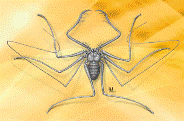Papers in the Biological Sciences

Eileen Hebets Publications
Document Type
Article
Date of this Version
1-1-2006
Citation
Journal of Arachnology (2006) 34: 62–76
Abstract
Intraspecific interactions in adult whip spiders (Phrynus marginemaculatus) were investigated in a laboratory setting to quantify agonistic interactions and to determine predictors of contest outcome. Males were initially paired with size-symmetric or size-asymmetric opponents to assess the effect of size symmetry on contests. Three weeks later, the same males were paired with either the same opponent, or a different opponent to determine whether or not individuals remember earlier encounters. Finally, we quantified aspects of female-female contests. Agonistic encounters between males are characterized by varying degrees of pedipalpal opening, elevation displays, and rapid flicking (~ 29 Hz) of the antenniform leg. Duration of elevation displays was a predictor of contest outcome, with individuals being more likely to win if they held an elevated posture for longer than their opponent during the contest. Relative size influenced both contest duration and weight loss, with contests between size-symmetric males lasting longer and resulting in greater weight loss than size-asymmetric contests. In second contests, familiar encounters were both shorter in duration and involved fewer aggressive displays than unfamiliar second contests, suggesting that males were able to remember previous opponents. Females were less likely to exhibit aggressive displays than males, and female contests were shorter in duration than male contests. Overall, the results of our study suggest that agonistic interactions in P. marginemaculatus are extremely complex, varying with the sex and size-symmetry of individuals and involving elaborate signaling, and that there may be a large role for learning and memory.


Comments
Copyright © 2006, American Arachnological Society. Used by permission